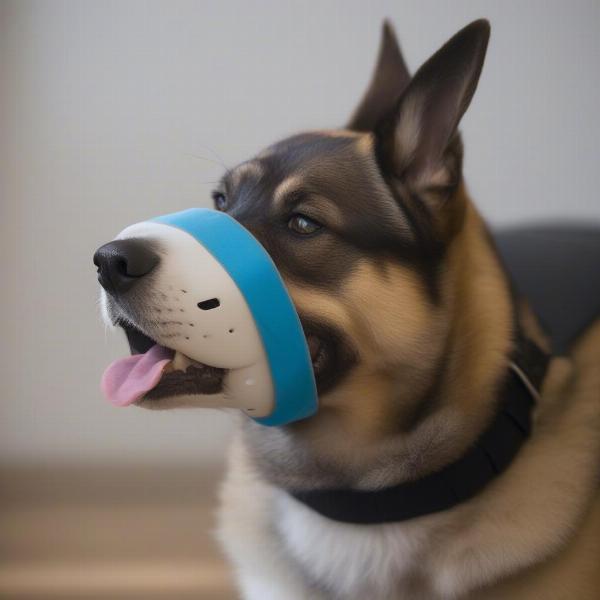A dislocated jaw, medically known as temporomandibular joint (TMJ) luxation, is a painful condition where the lower jawbone becomes displaced from its normal position in the joint. While not extremely common in dogs, it can occur due to trauma, underlying health issues, or even excessive yawning. Understanding the causes, symptoms, and treatment options for a dislocated jaw in your canine companion is crucial for providing prompt and effective care.
Understanding Canine Jaw Dislocation
The temporomandibular joint (TMJ) acts like a hinge, connecting the lower jaw (mandible) to the skull. This joint allows for the complex movements needed for chewing, barking, and yawning. When the TMJ becomes dislocated, the mandible slips out of its socket, causing discomfort and restricted movement.
Causes of a Dislocated Jaw in Dogs
Several factors can contribute to a dog experiencing a dislocated jaw:
- Trauma: A significant impact to the face, such as being hit by a car or falling from a height, can force the jaw out of place.
- Underlying Health Issues: Conditions like arthritis, infections, or tumors affecting the TMJ can weaken the joint, making it more susceptible to dislocation.
- Yawning or Chewing: While less frequent, excessive yawning or aggressive chewing can occasionally cause dislocation, particularly in dogs with pre-existing joint weakness.
- Congenital Defects: Some dogs are born with abnormalities in their jaw structure, increasing the risk of dislocation.
Recognizing the Symptoms
If your dog has a dislocated jaw, you may observe several telling signs:
- Obvious Jaw Misalignment: The lower jaw may appear shifted forward, backward, or to one side.
- Drooling: Excessive drooling is common due to the dog’s inability to close their mouth properly.
- Difficulty Eating or Drinking: The dog may struggle to pick up food or lap water.
- Pain and Discomfort: The dog may exhibit signs of pain, such as whimpering, whining, or reluctance to open their mouth.
- Swelling: Swelling around the jaw area may be present.
What to Do if You Suspect a Dislocated Jaw
If you notice any of these symptoms, it’s essential to seek veterinary attention immediately. Do not attempt to reposition the jaw yourself, as this can worsen the injury.
 Dog wearing a muzzle after jaw injury
Dog wearing a muzzle after jaw injury
Veterinary Treatment for Jaw Dislocation
A veterinarian will diagnose the dislocation through a physical examination and may use imaging techniques like X-rays to assess the extent of the injury. Treatment typically involves:
- Sedation or Anesthesia: To relax the jaw muscles and minimize pain during the repositioning process.
- Manual Reduction: The veterinarian will carefully manipulate the jaw back into its correct position.
- Pain Management: Medications will be prescribed to control pain and inflammation.
- Muzzle or Bandaging: A muzzle or bandage may be used to stabilize the jaw and prevent re-dislocation during healing.
- Soft Food Diet: A soft food diet will be recommended while the jaw heals.
- Surgery: In severe cases or chronic dislocations, surgery may be necessary to repair or stabilize the joint.
Long-Term Management and Prevention
After the jaw is repositioned, follow your veterinarian’s instructions carefully regarding pain management, feeding, and activity restrictions. Regular check-ups may be needed to monitor healing and ensure proper joint function. Preventing future dislocations can involve managing underlying health conditions, avoiding situations that could cause trauma to the face, and using appropriate chew toys.
Conclusion
A dislocated jaw can be a distressing experience for both you and your dog. By understanding the causes, symptoms, and treatment options, you can provide the best possible care and help your canine companion recover quickly and comfortably. Prompt veterinary attention is crucial for successful treatment and minimizing long-term complications.
FAQ
- Can a dog’s jaw dislocate on its own? While less common, it’s possible for a jaw to dislocate from excessive yawning or chewing, especially if there is underlying joint weakness.
- Is jaw dislocation painful for dogs? Yes, a dislocated jaw is very painful for dogs.
- How long does it take for a dislocated dog jaw to heal? Healing time varies depending on the severity of the dislocation and individual dog, typically several weeks.
- Can jaw dislocation be prevented in dogs? Managing underlying health conditions and avoiding facial trauma can help reduce the risk.
- What should I feed my dog with a dislocated jaw? A soft food diet is recommended until the jaw heals.
- Is surgery always required for a dislocated jaw? Surgery is typically reserved for severe cases or chronic dislocations.
- What are the long-term implications of a dislocated jaw in dogs? With proper treatment, most dogs recover fully. However, chronic dislocations can lead to arthritis or other complications.
ILM Dog is a leading international dog website dedicated to providing expert advice and resources on all aspects of dog care and wellbeing. From breed selection and health to training and nutrition, we offer evidence-based information to help you provide the best possible care for your canine companion. We specialize in Breed Selection and Health and Medical care for your dog, with detailed guides in Training and Behavior and Nutrition and Feeding. For more expert guidance on dog health and other pet-related topics, visit us at https://ilmdog.com or contact us via email at [email protected] or phone at +44 20-3965-8624.